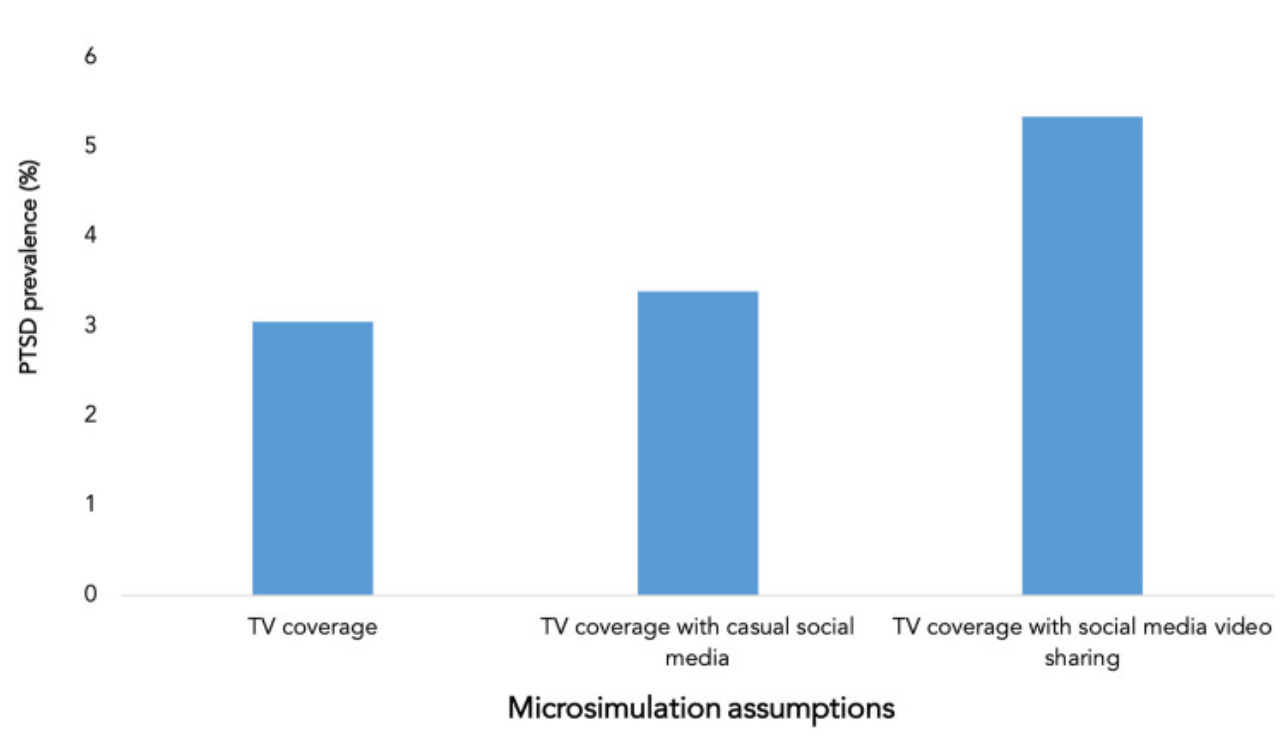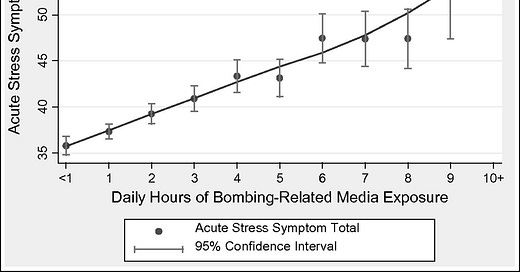Public health touches all aspects of our lives, not just during a pandemic and not just with infectious diseases. Thanks to your feedback, this newsletter will continue with Covid-19 updates and address other public health topics, like mental health. To choose what topics land in your inbox, click HERE.
The darkest parts of humanity continue to unfold with the Israel-Hamas War— millions face pain, suffering, separation, fear, loss, hunger, thirst, disease, and desperation. It’s beyond devastating.
Bearing witness to these experiences is nothing like being on the ground, but can be unrelenting in its own right. And, never has there been so much coverage of terror and horror on social media. The pictures. The details. The heinous acts. The constant exposure. The accompanying slurs.
It can evoke deep sadness, significant stress, and vicarious trauma that is far-reaching and potentially long-lasting.
I partnered with a friend and colleague, Dr. Julie Kaplow—a psychologist specializing in the study and treatment of trauma and grief—to dive deep into what we’ve learned from other traumatic events, who is most impacted by this media coverage, and what we can do as individuals to lessen the blow.
What is vicarious trauma?
Events can negatively affect people a world away from the scene, especially when this involves witnessing fear, pain, grief, and terror that others have experienced. This is the “cost of caring”:
We empathize with victims and this can cause us to “feel their pain.”
We may also feel directly threatened, especially when we relate in some way to those most impacted—“this could be me” or “this will be me.”
We feel helpless to do anything.
Our attitudes and worldviews shift after exposure to distressing images of these events. This is vicarious trauma—the psychological impact of second-hand exposure to traumatic events. If left unrecognized and, in some cases, untreated, it can lead to depression, anxiety, PTSD, social withdrawal, substance abuse, or suicidal thoughts.
How many people experience it?
It’s challenging to estimate. Some studies find about 1 out of 30 people, some up to 1 in 8, and some closer to 1 in 4 people.
Regardless of the exact number, it does seem to impact mental health service surge capacity. One study in the Lancet found that heavy social media use after such events translates into an excess of 12% mental health service burden.
Prevalence varies because of variation in how vicarious trauma is measured and where it’s been studied. But, perhaps most importantly, the extent of suffering depends on the dose of exposure and socio-demographic predisposing factors.
Dose: Media exposure matters
Widespread media coverage of war, and particularly terrorism, has harmful effects on mental and physical health. And the more you interact with social media and television, the worse its impact. We’ve seen this over and over in the literature from other events:
In a 2014 Israeli study, the higher the media exposure during terror attacks, the higher the distress and post-traumatic stress symptoms levels.
After 9/11, those who watched 4+ hours of TV coverage daily were more likely to experience acute stress.
After 9/11, frequent early exposure to 9/11-related television predicted posttraumatic stress symptoms and physical health problems two to three years later.
After the Boston Marathon bombings, repeated bombing-related media was associated with higher stress than direct exposure. Acute stress steadily increased with additional hours of media exposure.

Unfortunately, most research has focused on television exposure. For example, in a systematic review, 97% of studies were about watching TV. Of course, the information landscape has changed. Social media is not unfiltered, mis/disinformation is rampant, and exposure can be unexpected (for example, encountering gruesome photos while scrolling through feeds of pets).
Some recent studies have tried to fill the space. One simulation study found community PTSD prevalence almost doubled after social media video sharing of a terror attack compared to television.

Socio-demographic predictors
Everyone can experience vicarious trauma, but certain socio-demographic groups are at higher risk:
Shared social identity with victims. For example, a study on the Pulse nightclub terror attack, which occurred on Latin night, found Hispanics and LGBTQ individuals were more likely to develop acute stress through media exposure than other demographics.

Relihan et al., Nature. Source here. Females are at far higher risk. One study in Pakistan found vicarious trauma among adolescent females was particularly high.
Pre-event traumatic exposure and/or traumatic loss. Your experience before an event significantly impacts how you experience a current event. One study found direct exposure to 9/11 or Sandy Hook was more likely to cause acute stress after the Boston Marathon bombing.
What can we do?
Of course, social media use can be a positive force too, like increasing social connectedness. One study found that social media was protective against vicarious trauma when the content was focused on heroic acts and viewing information about the conflict itself (rather than the suffering).
There are a number of things we can do to reduce vicarious trauma while remaining up-to-date on the Israel-Hamas War:
Turn off auto-play videos on social media.
Walk away from social media after a time. Put on a timer.
Pay attention to how you’re feeling. If you’re feeling overwhelmed, do activities that make you feel calm or relaxed.
Seek social support. Being around other people who care about you is one of the best ways to reduce stress.
Talk to someone you trust. This can be a family member, a friend, clergy, or a therapist.
Find ways to feel useful. This can include donating to causes that help address the needs of those suffering or even just reaching out to a neighbor or friend who is struggling.
If you have children, monitor what they’re seeing or hearing. As overwhelming as the media exposure is for adults, it can be even more confusing and stressful for kids. The National Child Traumatic Stress Network is a helpful resource for discussing war with kids.
Bottom line
Being witness to terrorist attacks and war can set off a cascade of collective trauma that results in physical, mental, and emotional impairment for thousands; far more extensive and for far longer than we may think. If you’re hurting, overwhelmed, and exhausted, you’re not alone.
Love, YLE and JK
Julie Kaplow, PhD, ABPP, is Executive Vice President of Trauma and Grief Programs and Policy and Executive Director of the Trauma and Grief Center at the Meadows Mental Health Policy Institute.
“Your Local Epidemiologist (YLE)” is written by Dr. Katelyn Jetelina, MPH Ph.D.—an epidemiologist, wife, and mom of two little girls. During the day, she is a senior scientific consultant to several organizations. At night she writes this newsletter. Her main goal is to “translate” the ever-evolving public health world so that people will be well-equipped to make evidence-based decisions. This newsletter is free, thanks to the generous support of fellow YLE community members. To support this effort, subscribe below:







This is a very helpful article.
Social media is a net negative for most of us. I don’t use it more than once in a blue moon, and I’m happier and less traumatized for that. Substack doesn’t count in my opinion. This is a salon of ideas.
And regardless of political affiliation, anyone giving a fair assessment to the American approach to this terrorism in Israel, and the necessary Israeli response (hopefully as surgical as possible), should give Biden credit. His old age is a major asset here, as is his Senate Foreign Relations committee experience, Vice presidential experience, and commitment to decency and decorum after events that aim to stoke horror. He takes his kids to a Holocaust site as a rite of passage in their education, and he “gets” the lessons of the past 80 years. I find comfort in steady, level-headed leadership from another era, the kind that is not formulated by the reactionary and fearful amygdala.
Cope with the cortex.
Thank you for this. I read the piece and then decided to comment, but when I saw some of the discussion here, I decided against it and went and deleted the email. I then decided to come back and comment anyway.
Your piece is very timely as I have been struggling emotionally with far too much access and diving into news sources about the ongoing conflict. I am a second generation American of Lebanese and Palestinian descent. I have never traveled to that part of the world. I am an American first and foremost and I love this country. Yet, it is simply unavoidable to have an emotional connection with the homeland of my ancestors. And watching what has taken place and continues to unfold pains me greatly. I will not attempt to discuss my views about the conflict, but I do need to step away a bit from the quantity of what I have been consuming, both on social media and television. I want to keep abreast of developments as the crisis is real, and it is serious. Yet at the same time, I have to maintain a sense of what I can control and the things I can control are things like being here for my family, talking with friends about how I'm feeling about what is happening, and taking care of my own health.
I wish the best for all of you here, and I'll just end here.